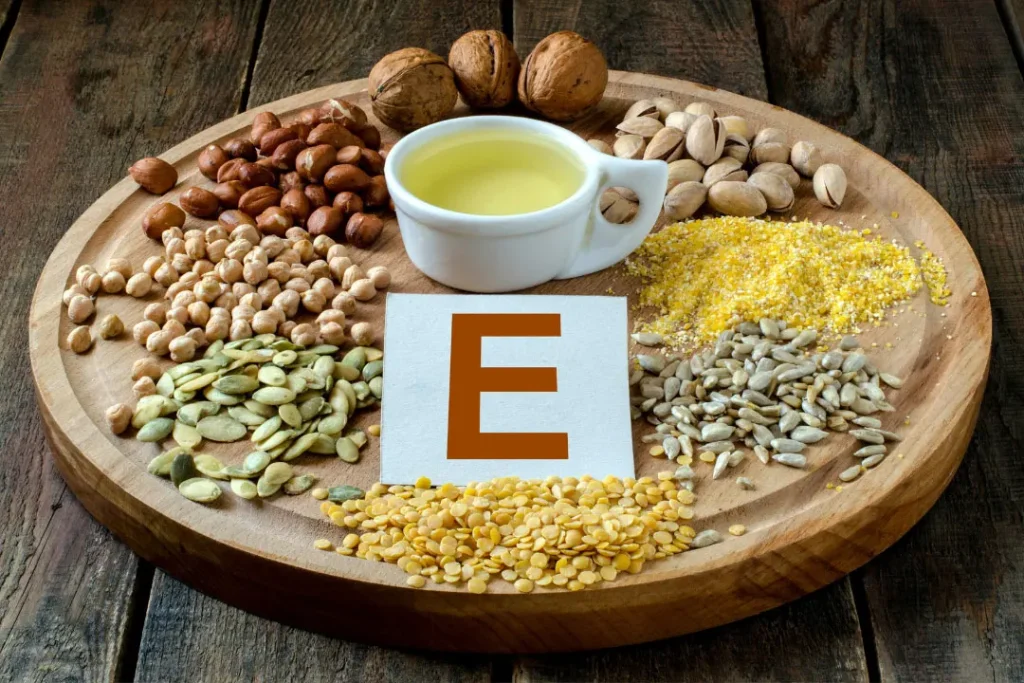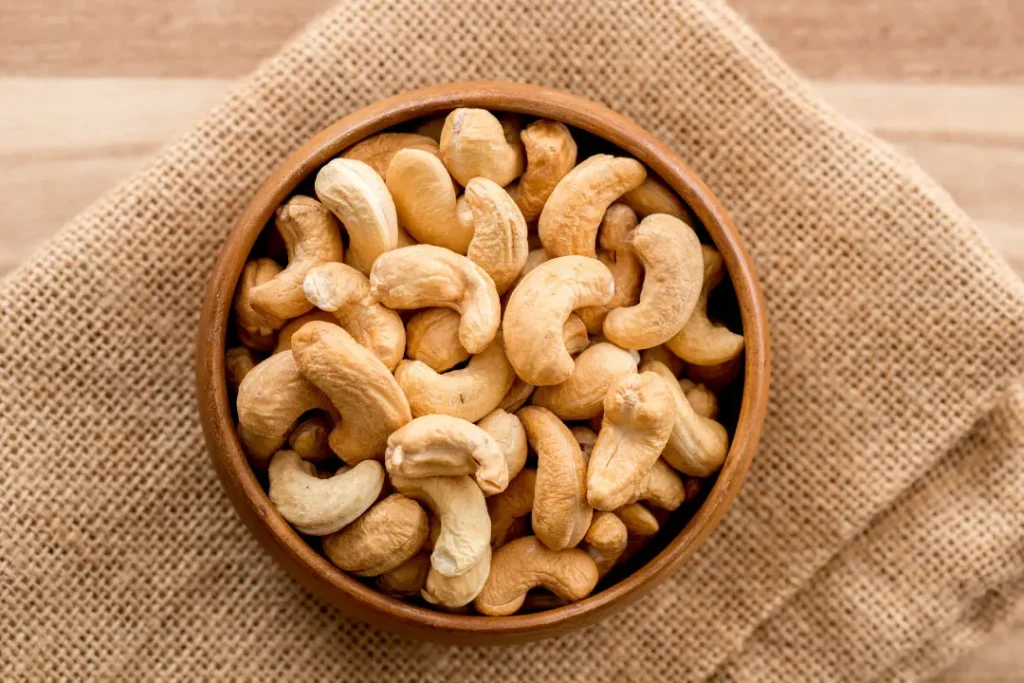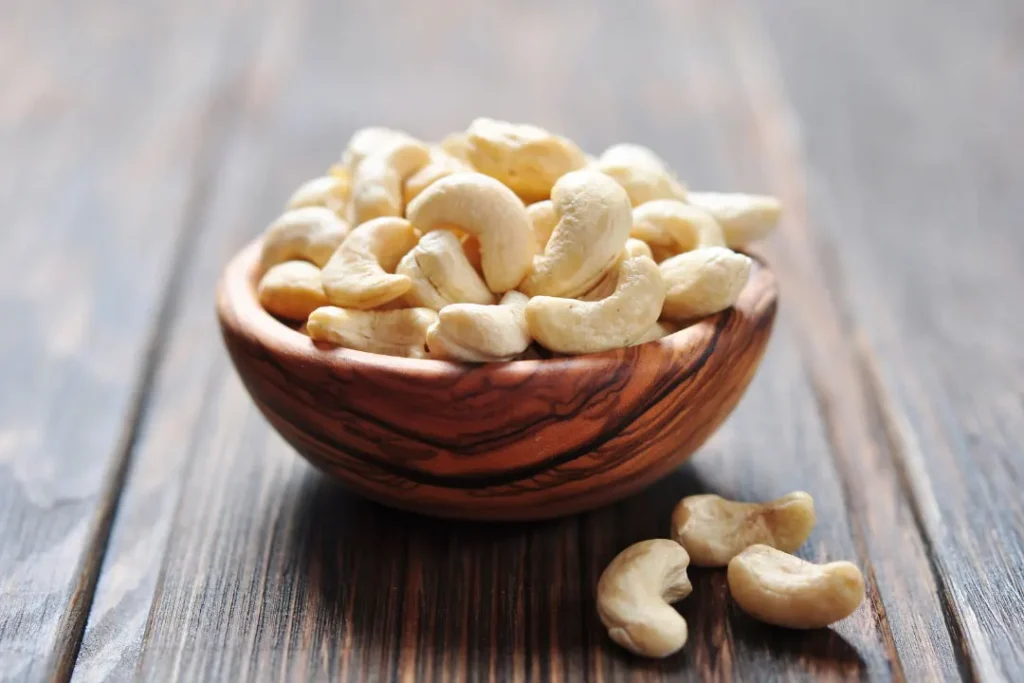The cashew tree, also known by its scientific name Anacardium occidentale, is a tropical evergreen tree best known for producing the cashew seed, a culinary nut that is very nutritious and popular around the world. The cashew has become known as a nutritional supplement in addition to being a gastronomic treat because of all of its health advantages. The nature of the cashew nut, its health advantages, the best dose, any potential negative effects, any possible drug interactions, and safe usage will all be explained in this essay.
You May Also Like:
5 Great Health Benefits of ElevATP: From Increased Energy to Better Brain Function…
Vitamin C: Benefits, Dosage, Side Effects, Drug Interactions, and Other Important Information
The Nature of Cashews
Essential elements including proteins, vitamins, minerals, and antioxidants are abundant in cashew nuts. Anacardic acids, cardanols, and cardols, which are all bioactive phenolic lipids with antibacterial, antioxidant, and anti-inflammatory activities, are among the substances that make up the nut’s distinctive makeup.
Chemically, cashews have a high concentration of oleic acid which is a monounsaturated fatty acid that has been associated with favorable effects on heart health. Additionally, cashews also contains linoleic acid, a polyunsaturated fatty acid essential for many biological processes. A number quantity of polyphenols, notably anacardic acid, which has been investigated for its possible anticancer qualities, may also be found in cashews.
The vitamins E, K, and B6, as well as the minerals copper, phosphorus, zinc, magnesium, iron, and selenium, are all abundant in cashews. Cashews are also a great source of other important vitamins and minerals.

Health Benefits of Cashews
Numerous health advantages of cashews have repeatedly been noted by scientific studies. Cashews may help to decease low-density lipoprotein (LDL) and raise levels of high-density lipoprotein (HDL) cholesterol. Thus, regular consumption of cashews has been linked to a lower risk of cardiovascular disease.
Cashews also provides dietary fiber which is good for the digestive system. According to studies, cashew consumption may help with weight control, mostly because of its high fiber and protein content, which encourages feelings of fullness and lowers total food intake.
Cashews also include many substances that may be anticancer. For instance, as previously stated, the high antioxidant content, especially anacardic acid, aids in the battle against oxidative stress, which is a major contributor to the development of many cancers.

Chemistry of Cashews
Cashews contain a variety of healthy components that are nutritionally complex. They are rich in selenium, magnesium, phosphorus, manganese, zinc, iron, and other vital vitamins and minerals. These nutrients have a variety of effects on physiological function and cellular metabolism.
Fat is one of the main components of cashews. Cashews is made up of mostly oleic acid and other monounsaturated fats, with a smaller quantity of polyunsaturated fats like linoleic acid. These fats have been linked to heart health advantages, such as a drop in LDL cholesterol and an increase in HDL cholesterol.
Protein and dietary fiber, which are crucial for sustaining satiety, encouraging good digestion, and supporting muscle development and repair, are also abundant in cashews.
In addition to these macronutrients, cashews are a great source of bioactive phenolic compounds such as cardanols, anacardic acids, and cardols. These substances have antioxidant, anti-inflammatory, and antibacterial effects. The anacardic acid has possible anticancer properties too.
Physiological Mechanism of Action of Cashews
The effects of cashews on the human body may be linked to their distinct chemical makeup. These effects are essentially metabolic and depend on the actions of the many chemicals involved.
- Cardiovascular Health: By enhancing lipid profiles, cashews’ monounsaturated and polyunsaturated fats may support heart health as oleic acid lower LDL cholesterol levels and raise HDL cholesterol levels.
- Digestive Health and Weight Management: By encouraging regular bowel movements, the dietary fiber in cashews helps to promote a healthy digestive tract. This fiber and the protein in the food make people feel full, which may help them limit their calorie intake and promote weight management.
- Antioxidant Activity and Cancer Prevention: Cashews contain powerful antioxidants such as anacardic acid and other phenolic substances. By disarming dangerous free radicals, these antioxidants fight oxidative stress, minimizing cellular damage and lowering the risk of chronic illnesses like cancer.
- Bone and Blood Health: Cashews are a good source of copper and magnesium, which are elements that are essential for maintaining bone health. Copper contributes to the synthesis of collagen and gives bones and blood vessels their shape and strength, while magnesium helps the structural development of bones. Additionally, the iron in cashews helps with the production of red blood cells and prevents anemia.
In conclusion, since cashews include such a wide range of nutrients and their effects on the body are complex. Their advantages extend to bone, intestinal, and cardiovascular health, and they show promise for disease prevention. To clarify the particular methods by which the bioactive chemicals in cashews influence human health, further studies are required.

Optimal Dosage of Cashews
A balanced diet may benefit greatly from including cashews because of their nutritional profile and positive health effects. However, moderation is essential to prevent excessive calorie consumption and subsequent weight gain owing to its high caloric content (approximately 553 calories per 100g). One ounce (28.3 grams), or roughly a handful of cashews, is the suggested serving size per day.
Despite its many advantages, cashews may have adverse effects, especially if ingested in excess. These include probable allergic responses in certain people and weight gain brought on by high-calorie content and excessive fiber. The symptoms of a cashew allergy range from mild oral allergy syndrome to severe allergic conditions like anaphylaxis.
Side Effects of Cashews
1. While most people may safely eat cashews while enjoying the health benefits they brought about, some possible negative effects might occur in certain people. This is mostly due to overeating or allergies. Weight Gain: Cashews are calorie-dense foods. If they are consumed in big quantities without being balanced with other foods and exercise, they may cause weight gain.
2. Digestive Problems: Cashews are an excellent source of nutritional fiber. Although fiber is good for your digestion, too much of it may cause gastrointestinal discomfort including bloating, constipation, or diarrhea.
3. Allergic Reactions: Some people may develop allergies to cashews. These responses may include everything from minor signs like itching and hives to more serious signs like breathing problems and life-threatening anaphylaxis.
4. Elevated Blood Pressure: Cashews have a considerable sodium content, especially if they have been salted. Consuming too much salt over time may raise blood pressure and cause cardiovascular issues.
5. Kidney Stones: Oxalates, which are abundant in cashews, may bind to calcium in the body and form crystals that might result in kidney stones. Avoid eating too many cashews if you have a history of kidney stones.
6. Mineral Deficiency: Cashews include phytic acid, which may bind to minerals like iron and zinc and perhaps prevent the body from absorbing them. Theoretically, mineral deficits might result from this over time, particularly in those whose dietary intake of nutrients is heavily reliant on nuts.
So, like with any meal, the key is moderation. These possible negative effects may be reduced by consuming cashews in moderation and as part of a healthy diet.

Potential Substance Interactions of Cashew
As mentioned, cashews contain a lot of phytic acids that may bind to minerals like iron and zinc and prevent them from being absorbed. Therefore, those who take mineral supplements or have mineral deficiencies should be aware of this possible interaction. Cashews’ phytic acid concentration may be greatly reduced and their mineral bioavailability increased by using techniques like soaking, roasting, or sprouting.
Responsible Use of Cashews
The majority of people are advised to include cashews in a balanced diet because of their high nutritional value and several health advantages. However, those who are known to be allergic to cashews should stay away from them. Additionally, persons who take mineral supplements or have mineral deficits should eat cashews carefully owing to the probable mineral binding caused by phytic acid.
In summary, cashew nuts are a nutritious powerhouse with multiple health advantages. Its inclusion in a balanced diet may support weight management, digestive health, and cardiovascular health, and perhaps even lower the risk of certain cancers.
You should consume cashews sensibly while keeping in mind the possible side effects and drug interactions. Research should go further into the special bioactive chemicals found in cashews and the processes by which they exert their health advantages in order to fully understand and explore the potential of cashews as a dietary supplement.

Cashews:
Conclusion
Cashews are going to be a valuable addition to your diet. These nutrient-packed nuts are a great source of healthy fats like HDL, vitamins, and minerals, including vitamin E, magnesium, and copper. Cashews offer dietary fiber to your diet and support heart health by lowering the risk of heart disease. This is due to their high oleic acid count which decreases unhealthy fat levels in the body.
Whether enjoyed as a snack, added to recipes, or used as a dairy alternative in plant-based milk and cheeses, cashews are a great choice of dietary supplement that provides a delicious and versatile way to enhance your nutritional profile. However, do take note of allergic reactions and consume cashews in moderate amounts to avoid unfavorable side effects.
References:
- “Nutritional Value and Health Benefits of Cashews.” Retrieved from: https://www.healthline.com/nutrition/are-cashews-good-for-you
- “Cashew Consumption Reduces Total and LDL Cholesterol.” Retrieved from: https://www.mayoclinic.org/diseases-conditions/heart-disease/in-depth/nuts/art-20046635
- “Chemistry and Biological Activities of Anacardic Acid Derivatives.” Retrieved from: https://www.ncbi.nlm.nih.gov/pmc/articles/PMC4853228/
Important Note: The information contained in this article is for general informational purposes only, and should not be construed as health or medical advice, nor is it intended to diagnose, prevent, treat, or cure any disease or health condition. Before embarking on any diet, fitness regimen, or program of nutritional supplementation, it is advisable to consult your healthcare professional in order to determine its safety and probable efficacy in terms of your individual state of health.
Regarding Nutritional Supplements Or Other Non-Prescription Health Products: If any nutritional supplements or other non-prescription health products are mentioned in the foregoing article, any claims or statements made about them have not been evaluated by the U.S. Food and Drug Administration, and such nutritional supplements or other health products are not intended to diagnose, treat, cure, or prevent any disease.


